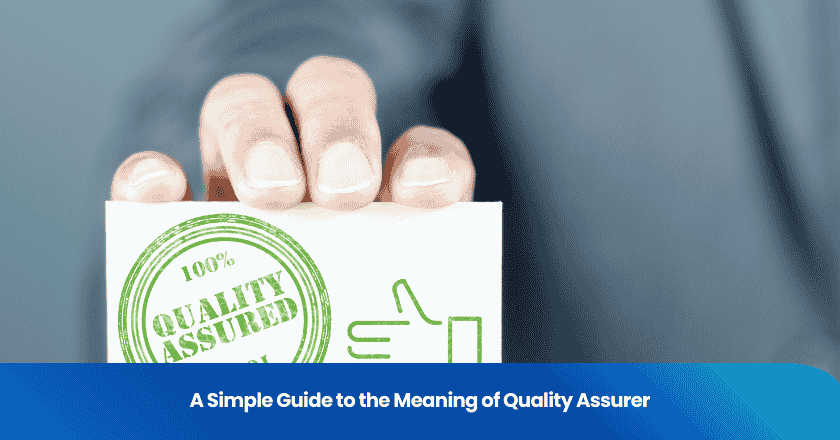
A quality assurer ensures that products, services, or processes meet set standards and customer expectations. The quality assurer meaning centers on preventing errors and maintaining consistency through careful checks and procedures.
- They focus on compliance, standardization, and prevention.
- Their work includes audits, documentation reviews, and testing.
Key Takeaways
- Quality assurers ensure products and services meet standards by preventing defects and maintaining consistency.
- They use audits, testing, and documentation to check compliance and improve processes.
- Strong skills like attention to detail, communication, and problem-solving help quality assurers succeed.
- Quality assurance focuses on preventing problems in processes, while quality control finds defects in finished products.
- Quality assurers boost customer satisfaction, reduce costs, and support continuous improvement for business success.
Quality Assurer Meaning
Simple Definition
A quality assurer meaning refers to a professional who oversees the processes that guarantee products or services meet established standards. This role focuses on assurance activities that prevent defects and maintain consistency. According to leading quality management organizations, quality assurance involves a systematic approach to ensure requirements are met and confidence in product reliability is established. The American Society for Quality describes quality assurance as a planned set of activities that aim to achieve quality by verifying that products or services fulfill specified criteria. Quality assurance professionals design and implement procedures that support reliability, safety, and customer satisfaction.
The main purpose of a quality assurer centers on maintaining the integrity of processes. They use standardized methods to check compliance, conduct audits, and review documentation. Their work reduces defects, improves customer satisfaction, and optimizes costs. Quality assurance also validates product safety and prevents failures, which helps organizations avoid costly recalls and maintain a positive reputation.
Quality assurer meaning highlights the importance of planned activities and systematic checks that build trust in products and services.
Key Skills
Quality assurers require a diverse set of skills to perform their duties effectively. Industry experts identify several key abilities that define success in this role:
1. Attention to Detail: Quality assurers must spot even the smallest inconsistencies that could affect product quality.
2. Analytical Thinking: They analyze data, break down complex problems, and identify the root causes of quality issues.
3. Communication Skills: Clear communication allows them to convey findings and requirements to team members and stakeholders.
4. Technical Expertise: Understanding industry standards, testing methodologies, and relevant tools enables thorough assurance activities.
5. Problem-Solving Skills: Quality assurers resolve defects and implement solutions that prevent future issues.
Quality assurer meaning also includes the ability to manage risk and promote continuous improvement. These professionals conduct internal audits, review specifications, and use quality assurance tools to enhance efficiency. They support employee training and skill development, which strengthens the overall quality management system.
| Certification | Description | Target Level / Audience | Prerequisites | Key Features |
|---|---|---|---|---|
| CSTE | Sets QA standards and boosts skills | Beginners | Degree + experience or 6 years QA experience | Recognized association, exam required |
| CSQA | Focuses on QA concepts, leadership, project management | Intermediate | Must meet CSTE eligibility | Validates planning and management skills |
| CAST | Basic QA testing and IT software | Beginners | Degree or experience | Includes study materials, exam required |
| CMSQ | Demonstrates management skills and QA competence | Managers | Recommended CSQA, QA employment, degree + experience | Includes reading materials, exam required |
| ISTQB | Internationally recognized, multiple levels | All levels | Experience varies by level | Global recognition, skill progression |
Quality assurers often pursue certifications to validate their expertise and advance their careers. These qualifications cover manual and automated testing, management, and leadership skills. They help professionals stay current with industry standards and support the continuous improvement culture central to quality assurance.
Tip: Quality assurer meaning extends beyond technical skills. Strong communication and analytical abilities are essential for driving quality improvements and ensuring compliance.
What Does a Quality Assurer Do
Main Tasks
Quality assurers play a central role in maintaining high standards across products and services. They develop and implement quality standards that align with regulations and company goals. Their work includes creating and managing quality control processes, such as testing protocols and inspections. These professionals oversee product testing and inspections to ensure that every item meets established quality requirements before release.
Quality assurers manage and mentor quality assurance teams. They hire and train staff to follow best practices in quality control. They identify and resolve quality issues by conducting root cause analysis and implementing corrective actions. Tracking key performance indicators, such as defect rates and customer complaints, helps them monitor the effectiveness of quality control measures. Continuous improvement remains a priority, with quality assurers adopting new technologies and refining procedures to enhance overall quality.
Tip: Quality assurers often lead problem resolution efforts and coordinate meetings to review data and discuss improvement strategies.
Main tasks performed by quality assurers:
1. Develop and update quality standards and policies.
2. Create and manage quality control processes.
3. Oversee product testing and inspections.
4. Mentor and train quality assurance teams.
5. Identify and resolve quality issues.
6. Track and analyze quality performance indicators.
7. Drive continuous improvement initiatives.
Daily Responsibilities
On a daily basis, quality assurers monitor and record customer interactions, including complaints and compliments. They conduct regular audits to ensure compliance with quality control standards and identify areas for improvement. These professionals perform satisfaction surveys after complaints to gather feedback and enhance service quality.
Quality assurers monitor calls and emails for compliance with data protection regulations. They analyze data trends and coach teams to improve performance. Leading investigations into non-conformances and implementing corrective actions form a key part of their routine. Internal audits and root cause analysis help maintain high quality standards.
In manufacturing environments, quality assurers inspect raw materials, components, and finished products. They perform quality tests using specialized equipment and document results. Collaboration with production teams ensures that any quality problems are addressed quickly. They verify compliance with regulatory requirements and maintain audit readiness.
| Daily Responsibility | Description |
|---|---|
| Product Inspections | Check raw materials, components, and finished goods for defects |
| Quality Testing | Use equipment to perform tests and record results |
| Data Analysis | Monitor trends and coach teams for better quality performance |
| Audit Preparation | Ensure documentation and systems meet quality control standards |
| Training | Educate teams on quality procedures and compliance |
| Problem Resolution | Lead investigations and implement corrective actions |
Note: Quality assurers use tools such as checklists, control charts, and automated testing systems to streamline daily tasks and maintain consistent quality.
Quality Assurance vs. Quality Control
Key Differences
Quality assurance and quality control serve different but complementary roles in maintaining high standards. According to ISO 9001, quality assurance takes a proactive, process-focused approach. It aims to prevent defects by establishing and maintaining effective systems throughout the product lifecycle. In contrast, quality control is reactive and product-focused. It involves inspecting and testing finished products to detect and correct defects before delivery.
| Aspect | Quality Assurance (QA) | Quality Control (QC) |
|---|---|---|
| Focus | Process-oriented: Prevent defects | Product-oriented: Detect and correct defects |
| Purpose | Ensure effective processes to prevent issues | Verify finished products meet standards |
| Timing | Proactive: Throughout the process lifecycle | Reactive: After production or at checkpoints |
| Responsibility | Management, process designers, quality teams | Inspection teams, testers, quality inspectors |
| Activities | Audits, documentation, training, SOP creation | Product inspections, testing, defect fixing |
| Goal | Build quality into the process | Catch defects before delivery |
Quality assurance activities include process planning, documentation, and continuous improvement. These efforts ensure that quality is built into every stage. Quality control focuses on product inspection, testing, and corrective actions. The main objective of quality assurance is to prevent defects, while quality control aims to identify and resolve them before products reach customers.
Tip: Quality assurance works throughout the entire production process, while quality control usually happens after production is complete.
How They Work Together
Quality assurance and quality control work hand in hand to deliver reliable products and services. Quality assurance sets the standards, develops procedures, and trains staff to prevent problems. Quality control checks the results, inspects products, and ensures that everything meets the required standards.
A quality assurer bridges both areas. They design and implement systematic activities like audits and process reviews, which form the backbone of quality assurance. At the same time, they oversee inspection and testing processes, which are central to quality control. For example, in a dairy plant, a quality assurer may establish hygiene procedures and train staff, while also checking packaging seals and product weights.
This collaboration creates a feedback loop. Quality assurance identifies areas for improvement, and quality control provides data from inspections and tests. Together, they drive continuous improvement, reduce defects, and support customer satisfaction.
Note: When quality assurance and quality control teams communicate and share findings, organizations achieve higher standards and fewer defects.
Quality Assurer in Quality Management
Role Importance
Quality assurers hold a vital position in quality management systems. They proactively ensure that high-quality products and services meet customer requirements before reaching the market. Their work prevents defects and reduces errors by embedding quality into every stage of production. This approach supports compliance with industry standards and regulations, helping organizations avoid legal issues and costly recalls.
Quality assurers contribute to continuous improvement by creating feedback loops and refining processes. They integrate tools such as Statistical Process Control and Six Sigma to optimize workflows. Their efforts build organizational trust and support a competitive advantage. Quality management frameworks like Total Quality Management and ISO 9001 rely on quality assurers to maintain consistency and drive improvement.
Quality assurers play a key role in reducing inefficiency, rework, and reputational damage. Their presence ensures that quality management systems function effectively and support organizational sustainability.
Quality assurers:
- Prevent defects through early intervention and rigorous testing.
- Enhance customer satisfaction by aligning products with customer expectations.
- Reduce costs by detecting errors early.
- Promote continuous improvement and risk mitigation.
Impact on Business
Quality assurers directly influence business performance by supporting customer satisfaction and driving improvement. Their work ensures that products and services consistently meet customer requirements, which leads to increased loyalty and repeat purchases. Satisfied customers often become brand advocates, generating positive word-of-mouth and attracting new clients.
Quality management systems benefit from the insights provided by quality assurers. They analyze customer feedback and satisfaction data to identify trends and improve service quality. Strategies such as targeted coaching, regular feedback, and personalized experiences help raise service standards and reduce churn.
| Company | Business Benefit | Measurable Outcome |
|---|---|---|
| Company X | Improved First Call Resolution | 25% increase over six months |
| Company A | Reduced Compliance Violations | 40% reduction via monitoring |
| Company H | Improved Performance Rate | 30% improvement through QA efforts |
Quality assurers foster a culture of continuous improvement by recognizing high performers and addressing gaps in team performance. Their efforts link directly to customer focus and business outcomes, such as higher retention rates and increased average order value. Studies show that 89% of customers are more likely to repeat purchases when they experience great service, highlighting the impact of quality management on satisfaction and return rates.
Quality assurers help organizations deliver consistent, high-quality products and services that meet customer requirements, driving business success and long-term growth.
Quality assurers drive continuous improvement and help organizations deliver reliable products and services. Their proactive approach sets standards, prevents defects, and fosters collaboration across teams.
- Leadership commitment and employee engagement support a culture focused on excellence.
- Regular audits and technology adoption enhance efficiency and consistency.
Quality assurance focuses on planning and process optimization, while quality control emphasizes inspection and defect correction. Recognizing these differences helps organizations build strong, resilient systems.
Organizations benefit from quality assurers through improved efficiency, reduced costs, and increased customer trust. Valuing their expertise ensures long-term business success.
FAQ
What is the main goal of a quality assurer?
A quality assurer aims to ensure products or services meet established standards. They focus on preventing defects and maintaining consistency throughout the production process.
Which industries need quality assurers?
Many industries rely on quality assurers. These include healthcare, manufacturing, finance, food and beverage, and telecommunications. Each sector values quality assurance for safety, compliance, and customer satisfaction.
How does a quality assurer differ from a quality controller?
A quality assurer focuses on process improvement and prevention. A quality controller inspects finished products for defects. Both roles work together to maintain high standards.
What qualifications help someone become a quality assurer?
Employers often look for degrees in science, engineering, or business. Certifications in quality assurance or testing also help. Strong analytical and communication skills are essential.
Why does quality assurance matter for businesses?
Quality assurance reduces errors, saves costs, and builds customer trust. It helps companies deliver reliable products and services, which supports long-term growth and reputation.
Grow your business with TradeAider Service
Click the button below to directly enter the TradeAider Service System. The simple steps from booking and payment to receiving reports are easy to operate.





